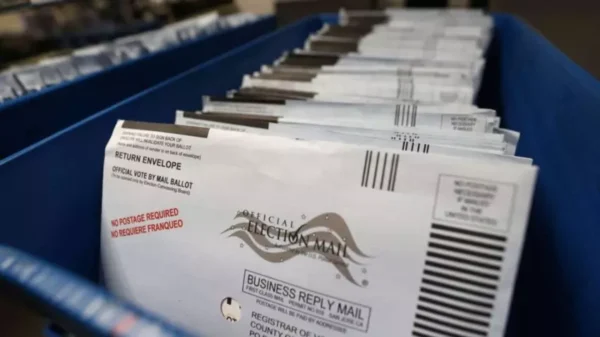At Liberty Podcast

Tomorrow's the big day: Election Day! The last day to vote. Here at the ACLU, we have just one closing argument: Everyone should be able to vote, and everyone’s vote should be counted. So, we want to prepare you to know your rights when you head to the ballot box. We've prepared a short and sweet audio guide for you. We'll see you at the polls!
This Episode Covers the Following Issues
Related Content
- CaliforniaApr 2025

Voting Rights
Issa V. Weber. Explore Case.Issa v. Weber
Congressman Darrell Issa sued to prevent California from counting mail ballots postmarked by election day and received within the following seven days, consistent with California law. If successful, literally hundreds of thousands of Californians will be disenfranchised at each election. The ACLU and its three California affiliates have sought to intervene in the case on behalf of the League of Women Voters of California to ensure that California voters are able to have their ballots counted consistent with state procedures.Status: Ongoing - Press ReleaseApr 2025

Voting Rights
Federal Court Rules Mississippi's Legislative Remedial Maps Still Violate Voting Rights Act In Desoto County. Explore Press Release.Federal Court Rules Mississippi's Legislative Remedial Maps Still Violate Voting Rights Act in Desoto County
JACKSON, Miss. — A federal court yesterday ruled that remedial state Senate maps passed by the Legislature earlier this year still do not remedy unlawful vote dilution in the DeSoto County area. New maps for the area will now be ordered into place by the court in advance of special elections set for November 2025. In March, the Mississippi Legislature proposed new legislative maps intended to comply with a 2024 federal court order to create additional legislative districts “in which Black voters have an opportunity to elect candidates of their choice.” The court order came after a group of plaintiffs, including the State Conference of the NAACP and individual Black voters from across the state, successfully proved at trial that the state House and Senate maps enacted after the 2020 Census diluted Black voting strength in violation of the Voting Rights Act of 1965. The court directed lawmakers to enact three remedial districts in the DeSoto County and Hattiesburg areas in the state Senate, and the Chickasaw and Monroe County area in the state House. Representing the plaintiffs, a coalition including the ACLU’s Voting Rights Project, the ACLU of Mississippi, the Lawyers Committee for Civil Rights Under Law, the Mississippi Center for Justice, and attorney Carroll Rhodes filed partial objections to the Legislature’s remedial plans as to the lines in the DeSoto County area and the Chickasaw/Monroe County area. The court’s decision accepted the Legislature’s remedial plans in the Hattiesburg area (which plaintiffs did not challenge) and in the Chickasaw/Monroe County area, but sustained plaintiffs’ objections in DeSoto County. Plaintiffs submitted alternative plans for the Senate districts in the DeSoto County area which the court will now consider as a potential remedy. The court also gave the state defendants seven days to propose their own alternative remedial map for the area. The following is reaction to the court ruling: “This is an important win for Black voters in the DeSoto County area, who deserve nothing less than a fully equal opportunity to elect candidates of their choice,” said Ari Savitzky, senior staff attorney with the ACLU’s Voting Rights Project. “The court’s decision makes that possible. We will keep fighting to enforce voters’ rights under the Voting Rights Act.” “The court rightly rejected the proposed DeSoto County senate districts. The Mississippi Legislature’s attempt to skirt the law would have actually diminished Black voting power in the northwest corner of the state.” Jarvis Dortch, executive director of the ACLU of Mississippi. “Our goal in this case is to achieve fair representation for Black people in Mississippi. This ruling striking down the state’s legislative map for DeSoto County takes an important step toward that goal. The court gave the state another chance to get its map right. We will carefully review the state’s new map to ensure that it enables Black voters to participate fully in the political process and to elect candidates of their choice,” said Jennifer Nwachukwu, senior counsel from the Lawyers' Committee for Civil Rights Under Law. The ruling is here. - Press ReleaseApr 2025

Voting Rights
Aclu Condemns House Passage Of Anti-voter Save Act, Calls On Senate To Reject It. Explore Press Release.ACLU Condemns House Passage of Anti-Voter SAVE Act, Calls on Senate to Reject It
WASHINGTON, D.C. — The American Civil Liberties Union condemns the U.S. House of Representatives’ passage of the SAVE Act, legislation that would require in-person documentary proof of citizenship to register to vote—an unnecessary and discriminatory measure that would effectively end online and mail voter registration, disenfranchise millions of eligible voters and destabilize election administration nationwide. The SAVE Act echoes failed and unconstitutional laws like Kansas’s proof of citizenship requirement, which purged over 30,000 eligible voters and was struck down in federal court. This legislation would especially harm naturalized citizens, voters with low incomes, voters of color, Native American voters, rural voters, and first-time voters—many of whom lack easy access to a passport or birth certificate. It would also threaten the voting rights of as many as 69 million women who have taken their spouse’s name but whose birth certificate does not match. By demanding burdensome documentation and triggering erroneous voter roll purges, the SAVE Act also threatens the ability of even long-time registered voters to stay on the rolls and participate in elections. In a statement, Molly McGrath, director of the ACLU’s national democracy campaigns, said: “The SAVE Act is a dangerous and unnecessary attack on voting rights that could block millions of eligible citizens from voting. We are already challenging President Trump’s unconstitutional executive order that seeks to impose similar restrictions through the Election Assistance Commission—an illegal overreach that threatens to upend our elections. This isn’t about protecting voters or our elections, it’s about politicians who want to protect themselves and pick and choose their voters. But that’s not how democracy works. The Senate must reject this bill and instead ensure that every eligible citizen can easily cast their ballot.” The ACLU urges the U.S. Senate to reject the SAVE Act and reaffirm its commitment to a fair, inclusive, and accessible democracy for all Americans. - Press ReleaseApr 2025

Voting Rights
Voting Rights Groups Challenge Trump’s Recent Executive Order. Explore Press Release.Voting Rights Groups Challenge Trump’s Recent Executive Order
WASHINGTON, D.C. — A coalition of voting rights organizations filed a lawsuit in the U.S. District Court for the District of Columbia to challenge President Trump’s unlawful executive order on voting that attempts to seize the power to set voter registration rules from Congress and the states, and doing so in a way that would violate federal law and the Constitution if carried out by the Election Assistance Commission (EAC). Key provisions of Trump’s order could disenfranchise millions of eligible voters, particularly voters of color, women voters, naturalized citizens, voters with disabilities, voters with low incomes, and first-time voters. The Constitution specifies that Congress and the states can set the rules for our elections, not the President. On March 27, several of the groups also sent a letter to the EAC urging them not to take action in response to key provisions in the executive order, as doing so would violate federal law. The National League of Women Voters, League of Women Voters of Arizona, League of Women Voters Education Fund, OCA - Asian Pacific American Advocates, Asian and Pacific Islander American Vote, Hispanic Federation, and NAACP are represented by the American Civil Liberties Union, ACLU of D.C., Brennan Center for Justice at NYU Law, the Legal Defense Fund, LatinoJustice PRLDEF, and Asian Americans Advancing Justice – AAJC (Advancing Justice – AAJC). The groups are challenging the order’s usurpation of powers, including its directive for the U.S. Election Assistance Commission to change the federal voter registration form to require burdensome submission of documents to prove citizenship, which many Americans do not have or cannot readily acquire. Under existing law, registrants already have to swear to their citizenship under penalty of perjury, and there is no evidence that non-citizens are registering to vote at significant rates. The coalition released the following joint statement about the lawsuit, League of Women Voters et. al. v. Trump et. al.: “The president has no constitutional or statutory authority to unilaterally dictate how elections are run. This executive order is a blatant violation of the separation of powers. Election rules are decided by Congress and the states, and any attempt by the executive branch to override their power violates the Constitution. This order, based on a persistent false and racialized narrative, could disenfranchise millions of eligible voters. It mirrors the SAVE Act, which would add unnecessary barriers to voter registration and silence the voices of American citizens. These unlawful attacks on voting rights are part of a broader effort to undermine our democracy. We have filed suit to stop this executive order and to keep it from interfering with eligible voters’ participation in our elections.”Court Case: League of Women Voters Education Fund v. TrumpAffiliate: Washington, D.C.
0:00
/0:01
0:01